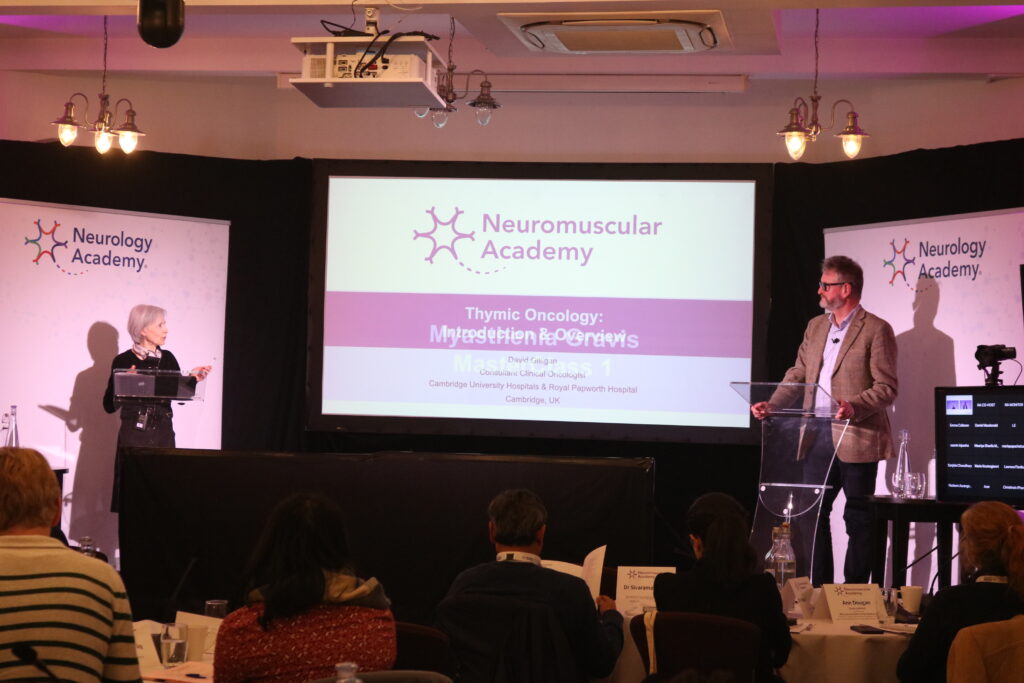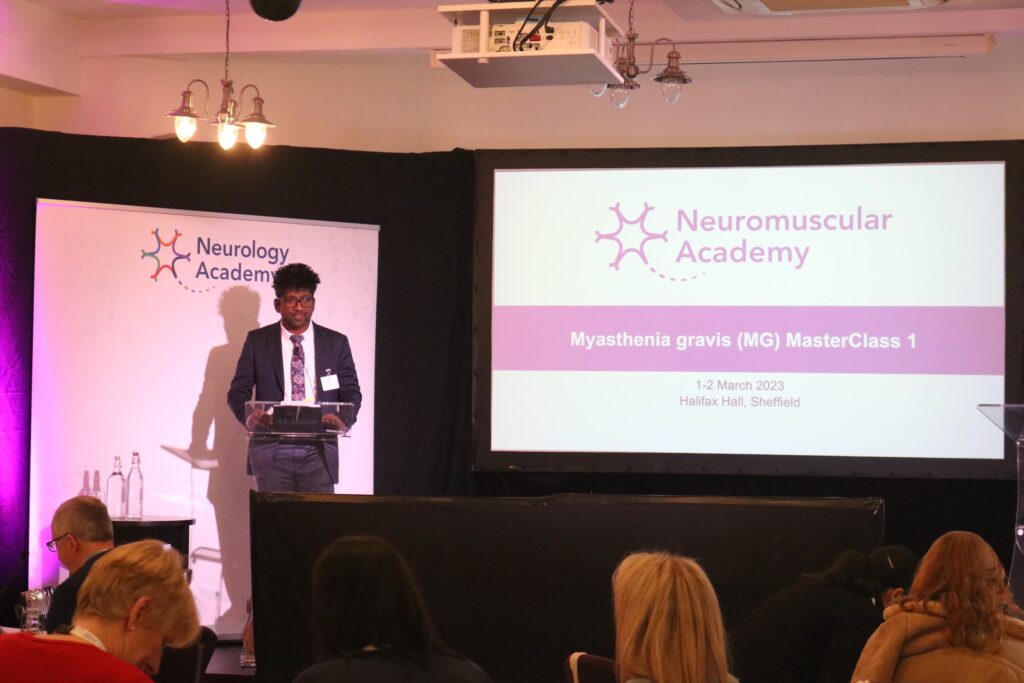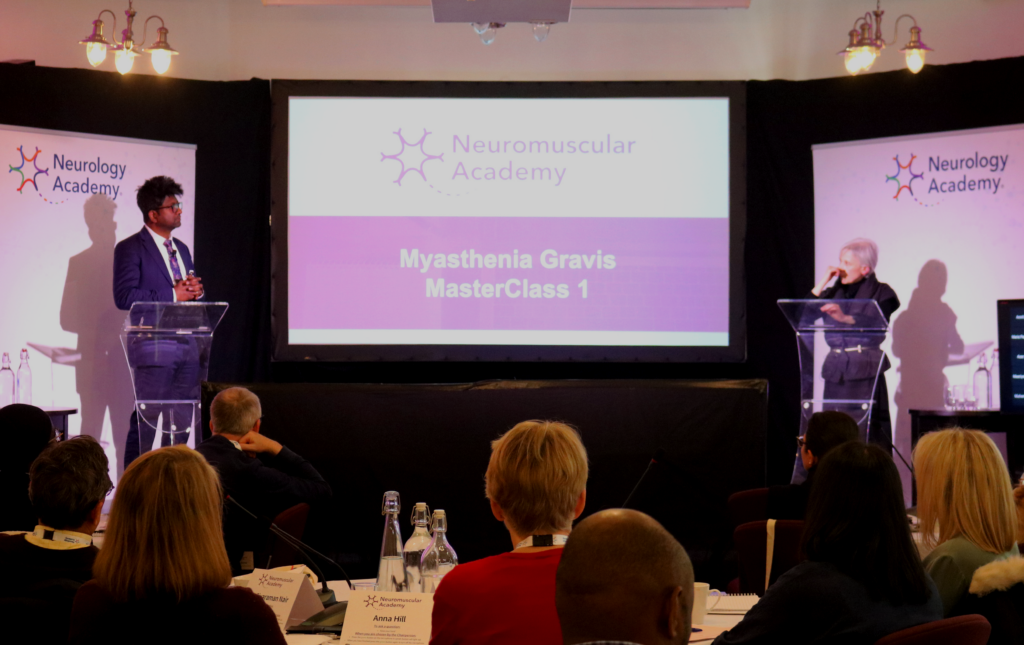The first Myasthenia Gravis (MG) Masterclass was organised by the Neuromuscular Academy and held over 2 days at Halifax Hall, University of Sheffield Campus in March 2023. The course was developed by Dr Channa Hewamadduma, Consultant Neurologist and Honorary Senior Lecturer at Sheffield Teaching Hospitals NHS Foundation Trust who saw the need for an educational programme in MG after seeing the benefits of the suite of Neurology Academy courses and in particular a similar course developed for Spinal Muscular Atrophy (SMA).
The was a hybrid course with both on site clinicians attending alongside virtual delegates streaming live into the conference from their own locations. In all, 54 delegates attended over the two-day course. In his opening remarks Channa highlighted the rationale for this education was to upskill delegates, enable networking with other clinicians working in MG with a view to promoting and standardising practice to reduce unwarranted variation in the delivery of MG services. Sue Thomas, Healthcare Consultant and founder faculty member of the Neurology academy highlighted in these opening remarks how other Masterclass programmes had achieved education and service transformation as a result of the educational model used.

The course opened with Professor Isabel Leite, Associate Professor and Consultant Neurologist, University of Oxford, outlining the pathology of MG according to antibody status (– AchR-Ab or MuSK-Ab+) and the impact on the neuromuscular junction which through their attack on the postsynaptic membrane, impair neuromuscular transmission and lead to weakness and fatigue. Isabel highlighted the key molecules and cells relevant to standard and current therapies in MG and the relevant targets for immunotherapies used in recent and ongoing Phase 3 clinical trials for MG.
This session was a very comprehensive introduction to MG with good explanation of the differences between AchR and MusK mediated disease and a great revision session. The speaker’s diagrams were very good and helped greatly with visualising the pathophysiology of MG and why targeted treatments will be more beneficial. The session was pitched at the right level for my understanding.
Session 2 – diagnostic pitfalls and the management of ocular MG was delivered by Dr Fiona Chan, Neurologist, University Hospitals Birmingham NHS Foundation Trust. Fiona was a very vibrant speaker providing excellent content in a well explained and well-structured talk. The presentation was an informative use of case studies with videos which gave practical tips to take back for managing patients. She gave a comprehensive structures review of all things ocular which contained a lot of new information to me and a rare sight into the world of neuropathology and orthoptics.
After refreshments, the next presentations were jointly chaired by Professor Leite and Dr Maria Farrugia, Consultant Neurologist, NHS Greater Glasgow and Clyde. Maria spoke about diagnostic challenges and management of generalised MG, again utilising a case history format. Although she had an hour for this session (which at first seemed as though it would be too long) there was not enough time and future meetings might want to extend this session. This excellent talk was very clear that management plans for patients need to be individualised and treatment planned carefully. There was very useful discussion regarding rituximab and thymectomy with age cut off surgery. It was a fast-paced and very informative session.

The next session was presented virtually by Maya Uccheddu a Pharmacist who has MG. This was a brave, insightful account of what it’s like to live with the implications of symptoms especially those which are not as easy to quantify such as fatigue. Maya had useful insights and reminded everyone to involve patients more, for example how to make best use of the timed appointments ensuring we make time for the patients’ priorities as well as our own.
The last session of the day was presented jointly by Dr Channa Hewamadduma, Professor Saiju Jacob, Consultant Neurologist, University Hospitals Birmingham NHS Foundation Trust and Professor Isable Leite. They presented the diagnostic journey through case history presentations. This was a really excellent session including highlighting the challenges of providing second opinions on patients who had received an initial assessment elsewhere. The speakers emphasised the need to take a full history, ensure or repeat testing on patients, indications for repeat imaging thymectomy and to be mindful of recurrence. There were excellent learning points – again the time flew past.
Following a short break there was an excellent networking informal dinner where we were able to meet many of the clinicians from other services.
Day two started at 8.30am with an overview of challenging cases from Dr Farrugia, Dr Channa and Professor Leite. Once more there was some concern about the length of the session being long but the time flew by and without a doubt the use of case studies is a really valuable learning tool for maintaining attention and audience participation. Again, a great opportunity to hear how experts are managing cases. The session was interactive with the audience and those on line showing that it is possible to benefit and actively participate in remote courses. I particularly liked the discussions between the presenters who challenged each other very nicely to get management points across.
Following this, Professor Saiju Jacob presented current guidance on the management of MG which was a truly excellent session. He provided an overview of the ABN guidelines and how these apply to practice. This was very helpful from a nursing perspective as nurses are less familiar with the guidance. There was also an excellent overview of emerging therapy.

After refreshments the Professor presented a further session on Rituximab/B-cell therapies in MG covering the role of B cells in the pathophysiology of MG, Practical use of rituximab in MG and newer B-cell therapies. This was very useful to revise pathology rationale for use and again it would have been good to have more time on this session.
Dr Georgina Burke, Consultant Neurologist, University Hospital Southampton NHS Foundation Trust, provided the next session on MG in adolescence and pregnancy giving a natural history of childhood MG, management challenges on young people and an overview of best practice guidelines for MG and pregnancy. It was very helpful to have this on management of young people as it’s an area that’s not well covered. There was a good mix of case studies outlining a very practical approach to the presentation which was also a very comprehensive and practical guide for management of MG in pregnancy.
The final afternoon of the course was a packed schedule with novel therapies presented by Dr Channa which was an excellent summary and mostly new information to me. Dr Farrugia covered fatigue in MG which contained helpful principles of care and guidance for patients and good links to further information and scales.
There was a compilation of speakers for the session on the Thymus gland and MG with Professor Leite covering thymic pathology and neurology, Dr Stuart Viegas, Consultant Neurologist, Imperial College Healthcare NHS Trust addressing surgical management of thymus, Mr Alan Kirk Consultant Thoracic Surgeon, Golden Jubilee Hospital, Glasgow addressing thymic oncology and Dr David Gilligan, Medical Oncologist, Cambridge University Hospital addressing the role of the neurologist in the thymic multidisciplinary team.
Finally, to round the day off Dr James Alix, Consultant Neurophysiologist at Sheffield Teaching Hospitals NHS Trust revised the neurophysiology of MG covering the basic physiology of neuromuscular transmission, how repetitive nerve stimulation and single fibre EMG are done and what the results mean and limitations of neurophysiological testing for MG.
This was an extremely packed two-day course – which could have run for longer as it was so interesting and comprehensive. The mixture of delegates attending included neurologists, neurology registrars, neuromuscular physicians, neuromuscular nurses, specialist nurses and neurology pharmacists. All expressed the desire to maintain the network and participate in further training. The event was supported by UCB and argenx who had no input into the programme but certainly have generated a very enthusiastic cohort of professionals working in MG which we hope will continue to grow and flourish to ensure all people with MG have access to the high standard of care the speakers discussed throughout the course.
More details about the Neuromuscular Academy can be found here: neurologyacademy.org/neuromuscular-academy
Read more about Myasthenia Gravis in ACNR:
Overview of new developments in myasthenia gravis therapy, by Reuben Beer and Stefan Blum.